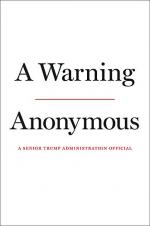
|
| Name: _________________________ | Period: ___________________ |
This quiz consists of 5 multiple choice and 5 short answer questions through Chapter 7 – Epilogue.
Multiple Choice Questions
1. What is the title of Chapter 6?
(a) "The New Mason-Dixon Line."
(b) "Sanctions Are Coming."
(c) "Collapse of the Steady State."
(d) "A Weakness for Strongmen."
2. For how long was John McCain held as a prisoner of war in Vietnam?
(a) 6 months.
(b) 3 years.
(c) 2 years.
(d) 5 years.
3. What was Tom Bossert's position in the Trump administration?
(a) Secretary of Defense.
(b) Treasury Secretary.
(c) Homeland Security Advisor.
(d) White House Communications Director.
4. Who argued against Cleon that ill-tempered decisions were reckless, according to the author in Chapter 6?
(a) Diodotus.
(b) Socrates.
(c) Euclides.
(d) Aristotle.
5. What judge related to a lawsuit against Trump University did Trump accuse of bias because the judge was of Mexican heritage?
(a) Judge Gonzalo P. Curiel.
(b) Judge Jerome Powell.
(c) Judge Brett Kavanaugh.
(d) Judge Scott Pruitt.
Short Answer Questions
1. Whom did President-Elect Trump replace his transition chief with after his election victory?
2. Among the quotes attributed to Donald Trump in Chapter 2, one of them attributes what to being "one of the greatest inventions of all times" (55)?
3. What did the essays by Alexander Hamilton, James Madison, and John Jay in support of the Constitution become known as?
4. Who is the "once-respected Fox host whose late-night show is now riddled with conspiracy theories and wild speculation about current events" that Donald Trump admires (66)?
5. What was the U.S. federal budget deficit when Obama took office in 2009?
|
This section contains 250 words (approx. 1 page at 300 words per page) |

|




